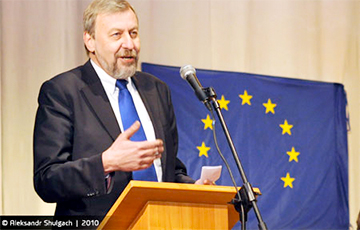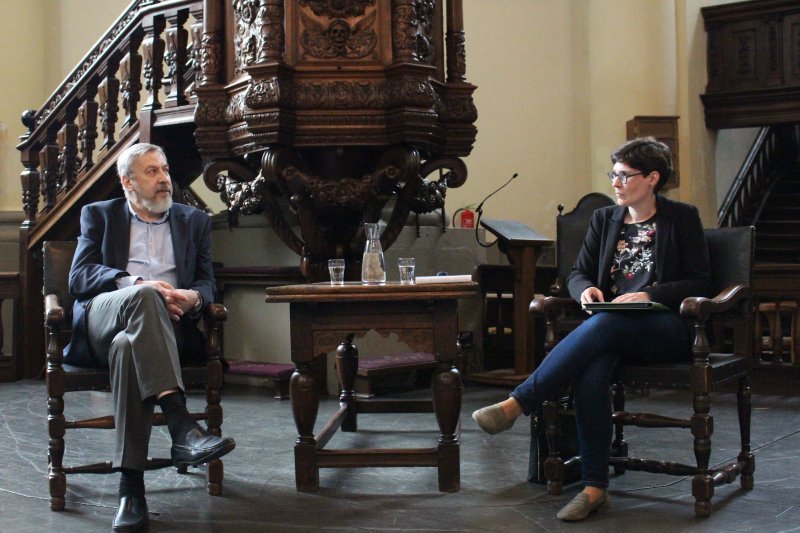Andrei Sannikov: There Is No Doubt That Dictatorship In Belarus Will Fall
- 25.06.2018, 13:05
- 11,219

European commissioners behave like "lame ducks."
The leader of the European Belarus civil campaign, Andrei Sannikov, commented on the visit of two EU commissioners in Belarus – EU Commissioner for European Neighborhood Policy and negotiations on the EU expansion Johannes Khan and Commissioner for Digital Economy and Society Mariya Gabriel. At the beginning of the conversation with Charter97.org, the politician told about his speech at the University of the Dutch city of Groningen, from where Andrei Sannikov had just returned.
– That was an interesting invitation. It came from students. I was a guest at the celebration of the 30th anniversary of the university historical society. The lecture took place in the largest Protestant church of the city. More than 100 students were present. The guys had found me themselves. I think the fact that they came across my book "Belarusian Amerikanka or Elections Under Dictatorship" had no small part in it. The library of this university got a book from the publisher, as soon as it was released. This year, radioactivity is the theme of the final events at the University of Groningen. Accordingly, we discussed both the Chernobyl tragedy and nuclear disarmament.
The organizers divided our meeting into three sections: the consequences of Chernobyl and the NPP in Astravets, which is being built in Belarus. The second section was nuclear disarmament and the disintegration of the Soviet Union. The third one – the dictatorship in Belarus and the situation in the region.
– And how do you explain the interest of young Europeans in the situation in the region?
– It was not my first time to speak in Holland and I have to say that the student audience there is notable for quite good knowledge. I do not know how to explain this. Probably, it’s due to the quality and level of education. The guys are really interested not only in their country and neighboring states, but also in what happens in Europe and the world, on the borders of the European Union.

– May this interest, in particular, be associated with the tragedy that happened with the flight MH17?
– I do not think it has something to do with that. I would say the following: the tragedy with MH-17 affected the attitude towards Russia, young people perceive it in a more negative way now.
– What do you tell foreign audience, who are interested in our country, in the first place?
– When I meet with the youth, I have one message. I say honestly that today, I do not see any leaders in Europe, capable of preserving and protecting European values. And that’s why, at my meetings with young Europeans, I say that they are our white hope.
The new generation understands the modern world much better, if only because it has mastered modern technologies much better than the leaders of their countries. And soon they will decide what the world should be like. The young people, who graduate from universities today, will very soon start to determine the destiny of their countries, Europe, and, possibly, our country. Therefore, it is always interesting to talk to them, it is always interesting to know their opinion, and it’s always a pleasure when they respond.
In general, they did not cast any doubt on the fact that Belarus is under the thumb of a dictator and asked good questions about relations with Russia. About what role Russia has played in the formation of this dictatorship. How Russia will react when the dictatorship in Belarus falls. And there was no doubt that it would fall.
– What was most shocking in the stories about Belarus?
– In general, almost everything. The fact that there is such police lawlessness. The fact that the people are so defenseless. The fact that there are constant lies on the state television and radio, in the newspapers and so on. A lot was surprising and really shocking, because they do not realize how people live in Belarus today. But, generally speaking, they know about Astravets, the fact that, despite the consequences of Chernobyl, another "miracle" is being built in Belarus.
– You’ve said that you do not see leaders among today's European heads. How do you assess the last visit of two European commissioners to Belarus?
– This is just another demonstration of disregard for European values. As they did not demand anything from the stated conditions in relation to Belarus... After the first visit of Johannes Khan, Lukashenka has significantly advanced along the way of repression: this is the blocking of Charter97.org, these are amendments to the law on the media, which establish totalitarian control not only over the mass media, but even over their users, this is the criminal case against independent trade unions and the persecution of Hennadz Fiadynich and Ihar Komlik, this is the decree "on parasites", which introduces forced labor. All of these things are Lukashenka's response to Europeans’ flirtations.
I noticed that in his Twitter posts, Commissioner Khan enthusiastically comments on every meeting with Lukashenka and other criminals from official Minsk, but has never expressed solidarity with political prisoners and has never positively spoken about meetings with the opposition.
Commissioner Khan is Commissioner Füle 2.0. We have never received from Europeans any serious assessments, or an analysis of the "achievements" of the previous Commissioner Füle, who purposefully supported GONGO in Belarus, that is, the pro-governmental organizations that worked for the regime. He also tried to fudge some schemes of Lukashenka's recognition, but after the failure in Ukraine, he backed off. Khan behaves in much the same way, conducts about the same policy. Therefore, such visits do not cause anything except indignation. Lukashenka cynically and directly let him understand: "We will not do anything, but you give us money."
– What is the result of such a European policy towards Belarus?
– No longer a creeping one, but real occupation by Russia.
– What should democratic forces do in this situation?
– Protest. Overlook, do not ignore such visits. Appeal to Europeans, turn to those leaders who can somehow influence the situation. Appeal to the European parliamentarians, who are to monitor this and ask the commissioners uncomfortable questions. Today, the European Union representatives behave like "lame ducks" in Belarus: they hurry to reach imaginary results, knowing full well that they are facing another failure. So it turns out that today it’s not them who defend European values in Belarus, but Belarusians who fight against the dictatorship in Europe.













